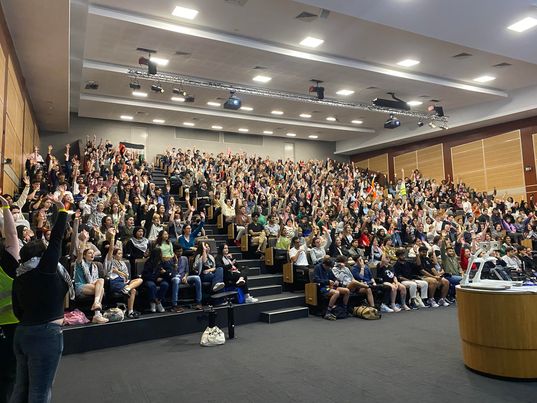
There are three words to describe the feeling of the Student General Meeting for Palestine: exhilarating, electrifying, historical.
More than 1500 students flooded the campus to have their say and support a vote calling for the university to divest from Israel. This was the biggest pro-Palestine mobilisation ever on an Australian campus.
Many students can testify to that. The line to enter the meeting began at 5pm and at 6:45 the meeting still hadn’t started. It snaked around from the UQ centre, wound through the food court and looped back down to the campus pharmacy, covering a distance of hundreds of metres.
What is just as impressive is what came before the meeting. This was the first Student General Meeting ever to be called by a petition requisitioning the union, which requires the support of 2% of the student population. Campus Palestine activists collected the necessary signatures of 1100 students to call the meeting within 24 hours, in an astonishing display.
As the first wristbands guaranteeing entry are being handed out, some Palestine organisers were nervously counting the numbers of students entering. The meeting needed a minimum of 300 student attendees to proceed officially. A few hours in, UQ security noted there were about 2000 students attending the meeting. Yes, enough for five SGMs.
How can this be explained? It’s clear that a wide layer of students sympathise with the plight of the Palestinians. The past week has seen an Israeli assault on supposed safe zones for refugees within Rafah. The atrocities that have been reported and documented on social media include children who have been decapitated by the force of munitions dropped by the Israeli Defence Force. Boeing, a weapons company which has a research centre on campus in the Hawken Engineering Building, is confirmed to have massacred the bombs used in these assaults. It is the horror of these images, and the ties of our universities to arming Israel, that have clearly mobilised students to act.
“After all the horrible images we’ve seen in social media and on the news, it’s clear that this is what our government supports. So young people have to stand with Palestine, and make our voices heard”, said UQ student, Jessica Abbo, while waiting in line.
It is also the result of two weeks of well-organised and prepared campaigning by activists. The campus has been covered with brightly coloured posters for weeks. Students at bus stops, cafes and all over the campus have had leaflets handed to them and arguments made about the importance and significance of the SGM. This hive of activity has operated from the Gaza Solidarity encampment which has been standing at UQ in the Great Court for more than a month.
Not even an alleged bomb threat could hinder the SGM from happening. The UQ Centre lecture theatre, the official venue with a capacity of 500 was overwhelmed, with security locking the doors to stop more students from entering. Three additional lecture theatres had to be set up for students to zoom into the debate, and the rules overturned to allow the zoom option, and for students outside to vote.
By coincidence, the meeting was held on the fifth anniversary of the previous one, in which UQ students overwhelmingly voted to oppose the Ramsey Centre for Western Civilisation coming to UQ. This is now the third SGM in a row at UQ to vote on a question of anti-racism, as the last SGM in 1974 voted on whether students should support land rights for Indigenous people and to support overturning racist government legislation. It’s clear UQ students have a strong legacy in standing up for justice and equality.
The meeting considered three questions:
- Should UQ sever ties with companies that supply the Israeli Defence Force?
- Should UQ shut down the Boeing centre?
- Should UQ financially divest from Israel?
There were four speakers for divestment. Mover and seconders Jaafar Jabur and Laura Nolan of the UQ Union spoke about the atrocities committed against the Gazans, how all the universities in Palestine have been destroyed and how UQ contributed to war crimes by collaborating with weapon companies like Boeing. Loud, angry cries of “shame” rang through the theatre.
Speakers for also agitated about how the university should be a place to learn to change the world for better, not worse, to rapturous applause. Member of Students for Palestine and Socialist Alternative, Oula Shihan, summarised the pro-Palestine arguments:
“We are fighting for a different kind of society. Like generations of student activists before us, we want a world free of war, free of oppression and apartheid.”
“Our universities want to sell our education to the highest bidder. To them, it doesn’t matter that they accept blood money from companies like Boeing, which boasts of how close its relationship with Israel is.”
“We are fighting for that different world today, and this vote is a part of that. It’s about saying we won’t stand by while our uni prioritises profits over human lives. It’s about taking a bold stand against imperialism.”
“We want our activism to link up with the struggles of the oppressed, the exploited and downtrodden, the working class and the poor all around the world. That’s what this vote is about.”
No wonder why those in the audience gave roaring cheers and claps. No wonder why students chant “From the river to the sea” in solidarity with the Palestinians, although UQ has attempted to silence Palestine activists and stop them chanting such controversial slogans.
Only one student spoke against the motions. He started by identifying as an Israeli-Australian and attempted to make moderate arguments of “understanding both sides” and supporting “academic freedom” by allowing students to collaborate with weapons companies. He further argued that the Vice Chancellor had assured him that there are no formal ties between UQ and Israel. These arguments attracted no cheers and little claps, and some scoffed near the end of the speech. I think you can assess the validity of these arguments by paying the Boeing centre a visit.
When it was time to vote, hundreds of students inside and outside the venue voted ‘yes’ to the questions above by a sea of raised arms, an absolute majority.
When asked how she felt about participating in the historic meeting, Palestine activist, Emma McCarthy, said
“It’s taken so long to find a seat, which is awesome. I think that shows how effective the camp has been.”
“When we voted, hundreds of students said yes, to show that we wouldn’t be complacent in genocide. And when the chair says it’s carried, it was just like, amazing!”
“I don’t know if I will have that sort of experience again, it was one of the best things I’ve ever seen or heard.”
At the conclusion of the meeting, Ella Gutteridge, one of the speakers who spoke in support of a yes vote, announced to the crowd that there would be an impromptu march to the Vice Chancellor’s office. Megaphones quickly appeared as a sea of over a thousand students marched to the chancellery building, with chants “Shame, shame, UQ shame”, “Disclose, divest, we will not stop, we will not rest”.
Indigenous activist and socialist, William Sim, said in a speech at the Vice Chancellor’s office, after the vote.
“When I grew up as a young Indigneous man in the regions, I thought my people were always going to be oppressed. I thought the Palestinians were always going to have to suffer and face genocide. But seeing this many people out today, it fills me with hope for the future”.
This was the biggest mobilisation at UQ since protests against South African apartheid. This was the culmination of student activism generated by the encampments across the country, designed to attract further attention to the Palestinian cause as Rafah is under attack. This was a resounding victory for justice, for anti-racism, and humanity.
Views: 176
